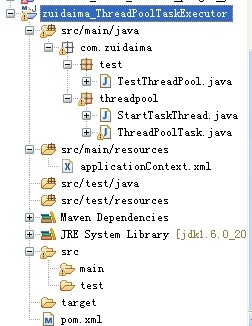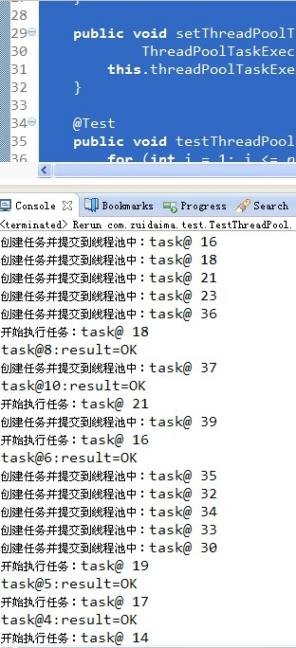spring线程池ThreadPoolExecutor配置并且得到任务执行的结果
2017-02-07 10:06
696 查看
用ThreadPoolExecutor的时候,又想知道被执行的任务的执行情况,这时就可以用FutureTask。
ThreadPoolTask
模拟客户端提交的线程
SPRING配置文件
测试类
原文中有些纰漏,我已经修改
项目截图(基于maven构建)

运行截图:

如果遇到cpu忙执行超过1秒的会返回null

原文:http://www.blogjava.net/paulwong/archive/2011/12/07/365773.html
ThreadPoolTask
01 | package com.zuidaima.threadpool; |
02 |
03 | import java.io.Serializable; |
04 | import java.util.concurrent.Callable; |
05 |
06 | public class ThreadPoolTask implements Callable<String>,
Serializable { |
07 |
08 | private static final long serialVersionUID = 0 ; |
09 |
10 | // 保存任务所需要的数据 |
11 | private Object threadPoolTaskData; |
12 |
13 | private static int consumeTaskSleepTime = 2000 ; |
14 |
15 | public ThreadPoolTask(Object
tasks) { |
16 | this .threadPoolTaskData = tasks; |
17 | } |
18 |
19 | public synchronized String call() throws Exception
{ |
20 | // 处理一个任务,这里的处理方式太简单了,仅仅是一个打印语句 |
21 | System.out.println( "开始执行任务:" + threadPoolTaskData); |
22 | String result = "" ; |
23 | // //便于观察,等待一段时间 |
24 | try { |
25 | // long r = 5/0; |
26 | for ( int i = 0 ; i < 100000000 ;
i++) { |
27 |
28 | } |
29 | result = "OK" ; |
30 | } catch (Exception
e) { |
31 | e.printStackTrace(); |
32 | result = "ERROR" ; |
33 | } |
34 | threadPoolTaskData = null ; |
35 | return result; |
36 | } |
37 | } |
01 | package com.zuidaima.threadpool; |
02 |
03 | import java.util.concurrent.ExecutionException; |
04 | import java.util.concurrent.FutureTask; |
05 | import java.util.concurrent.TimeUnit; |
06 |
07 | import org.springframework.scheduling.concurrent.ThreadPoolTaskExecutor; |
08 |
09 | public class StartTaskThread implements Runnable
{ |
10 |
11 | private ThreadPoolTaskExecutor threadPoolTaskExecutor; |
12 | private int i; |
13 |
14 | public StartTaskThread(ThreadPoolTaskExecutor threadPoolTaskExecutor, int i)
{ |
15 | this .threadPoolTaskExecutor = threadPoolTaskExecutor; |
16 | this .i =i; |
17 | } |
18 |
19 | @Override |
20 | public synchronized void run()
{ |
21 | String task = "task@ " + i; |
22 | System.out.println( "创建任务并提交到线程池中:" + task); |
23 | FutureTask<String> futureTask = new FutureTask<String>( |
24 | new ThreadPoolTask(task)); |
25 | threadPoolTaskExecutor.execute(futureTask); |
26 | // 在这里可以做别的任何事情 |
27 | String result = null ; |
28 | try { |
29 | // 取得结果,同时设置超时执行时间为1秒。同样可以用future.get(),不设置执行超时时间取得结果 |
30 | result =futureTask.get( 1000 , TimeUnit.MILLISECONDS); |
31 | } catch (InterruptedException
e) { |
32 | futureTask.cancel( true ); |
33 | } catch (ExecutionException
e) { |
34 | futureTask.cancel( true ); |
35 | } catch (Exception
e) { |
36 | futureTask.cancel( true ); |
37 | // 超时后,进行相应处理 |
38 | } finally { |
39 | System.out.println( "task@" + i + ":result=" + result); |
40 | } |
41 |
42 | } |
43 | } |
01 | <?xml version= "1.0" encoding= "UTF-8" ?> |
02 | <beans xmlns= "http://www.springframework.org/schema/beans" |
03 | xmlns:xsi= "http://www.w3.org/2001/XMLSchema-instance" xmlns:mvc= "http://www.springframework.org/schema/mvc" |
04 | xmlns:aop= "http://www.springframework.org/schema/aop" xmlns:context= "http://www.springframework.org/schema/context" |
05 | xsi:schemaLocation=" |
06 | http: //www.springframework.org/schema/beans http://www.springframework.org/schema/beans/spring-beans-3.0.xsd |
07 | http: //www.springframework.org/schema/context http://www.springframework.org/schema/context/spring-context-3.0.xsd |
08 | http: //www.springframework.org/schema/mvc http://www.springframework.org/schema/mvc/spring-mvc-3.0.xsd |
09 | http: //www.springframework.org/schema/aop http://www.springframework.org/schema/aop/spring-aop-3.0.xsd |
10 | "> |
11 | <bean id= "threadPoolTaskExecutor" |
12 | class = "org.springframework.scheduling.concurrent.ThreadPoolTaskExecutor" > |
13 |
14 | <!-- 核心线程数,默认为 1 --> |
15 | <property name= "corePoolSize" value= "10" /> |
16 |
17 | <!-- 最大线程数,默认为Integer.MAX_VALUE --> |
18 | <property name= "maxPoolSize" value= "50" /> |
19 |
20 | <!-- 队列最大长度,一般需要设置值>=notifyScheduledMainExecutor.maxNum;默认为Integer.MAX_VALUE |
21 | <property name= "queueCapacity" value= "1000" /> --> |
22 |
23 | <!-- 线程池维护线程所允许的空闲时间,默认为60s --> |
24 | <property name= "keepAliveSeconds" value= "300" /> |
25 |
26 | <!-- 线程池对拒绝任务(无线程可用)的处理策略,目前只支持AbortPolicy、CallerRunsPolicy;默认为后者 --> |
27 | <property name= "rejectedExecutionHandler" > |
28 | <!-- AbortPolicy:直接抛出java.util.concurrent.RejectedExecutionException异常 --> |
29 | <!-- CallerRunsPolicy:主线程直接执行该任务,执行完之后尝试添加下一个任务到线程池中,可以有效降低向线程池内添加任务的速度 --> |
30 | <!-- DiscardOldestPolicy:抛弃旧的任务、暂不支持;会导致被丢弃的任务无法再次被执行 --> |
31 | <!-- DiscardPolicy:抛弃当前任务、暂不支持;会导致被丢弃的任务无法再次被执行 --> |
32 | <bean class = "java.util.concurrent.ThreadPoolExecutor$CallerRunsPolicy" /> |
33 | </property> |
34 | </bean> |
35 | </beans> |
01 | package com.zuidaima.test; |
02 |
03 | import org.junit.Test; |
04 | import org.junit.runner.RunWith; |
05 | import org.springframework.beans.factory.annotation.Autowired; |
06 | import org.springframework.scheduling.concurrent.ThreadPoolTaskExecutor; |
07 | import org.springframework.test.context.ContextConfiguration; |
08 | import org.springframework.test.context.junit4.AbstractJUnit4SpringContextTests; |
09 | import org.springframework.test.context.junit4.SpringJUnit4ClassRunner; |
10 |
11 | import com.zuidaima.threadpool.StartTaskThread; |
12 |
13 | @RunWith (SpringJUnit4ClassRunner. class ) |
14 | // 指定的运行runner,并且把你所指定的Runner作为参数传递给它 |
15 | @ContextConfiguration (locations = "classpath*:applicationContext.xml" ) |
16 | public class TestThreadPool extends AbstractJUnit4SpringContextTests
{ |
17 |
18 | private static int produceTaskSleepTime = 10 ; |
19 |
20 | private static int produceTaskMaxNumber = 1000 ; |
21 |
22 | @Autowired |
23 | private ThreadPoolTaskExecutor threadPoolTaskExecutor; |
24 |
25 | public ThreadPoolTaskExecutor
getThreadPoolTaskExecutor() { |
26 | return threadPoolTaskExecutor; |
27 | } |
28 |
29 | public void setThreadPoolTaskExecutor( |
30 | ThreadPoolTaskExecutor
threadPoolTaskExecutor) { |
31 | this .threadPoolTaskExecutor = threadPoolTaskExecutor; |
32 | } |
33 |
34 | @Test |
35 | public void testThreadPoolExecutor()
{ |
36 | for ( int i = 1 ;
i <= produceTaskMaxNumber; i++) { |
37 | try { |
38 | Thread.sleep(produceTaskSleepTime); |
39 | } catch (InterruptedException
e1) { |
40 | e1.printStackTrace(); |
41 | } |
42 | new Thread( new StartTaskThread(threadPoolTaskExecutor, i)).start(); |
43 | } |
44 |
45 | } |
46 |
47 | } |
项目截图(基于maven构建)

运行截图:

如果遇到cpu忙执行超过1秒的会返回null

原文:http://www.blogjava.net/paulwong/archive/2011/12/07/365773.html
相关文章推荐
- spring线程池ThreadPoolExecutor配置并且得到任务执行的结果
- spring线程池ThreadPoolExecutor配置并且得到任务执行的结果
- spring线程池ThreadPoolExecutor配置并且得到任务执行的结果
- spring线程池ThreadPoolExecutor配置并且得到任务执行的结果
- spring线程池ThreadPoolExecutor配置并且得到任务执行的结果
- spring线程池ThreadPoolExecutor配置并且得到任务执行的结果
- spring线程池ThreadPoolExecutor配置并且得到任务执行的结果
- spring线程池ThreadPoolExecutor配置并且得到任务执行的结果
- Spring线程池ThreadPoolExecutor配置并且得到任务执行的结果
- spring线程池ThreadPoolExecutor配置并且得到任务执行的结果
- spring线程池ThreadPoolExecutor配置并且得到任务执行的结果
- spring线程池ThreadPoolExecutor配置并且得到任务执行的结果
- 使用SPRING中的线程池ThreadPoolTaskExecutor并且得到任务执行的结果
- Spring线程池和JDK线程池的区别及与FutureTask配合使用得到任务执行结果
- spring boot使用自定义配置的线程池执行Async异步任务
- java线程池之ThreadPoolExecutor(三):提交任务并得到任务执行结果
- spring boot使用自定义配置的线程池执行Async异步任务
- Java7并发编程--4.2、在执行器中执行任务并且返回结果
- 【JAVA笔记】spring3.x配置--每天23:30分执行任务 & log4j.properties的配置
- 开启线程池 加入任务 传入参数 此任务能够在执行完成时得到返回值
